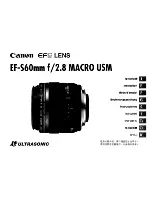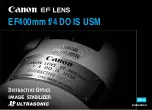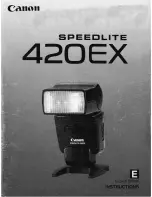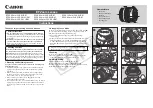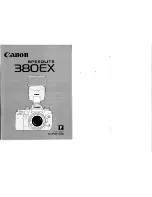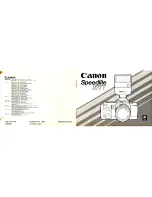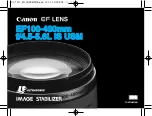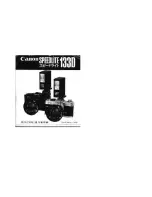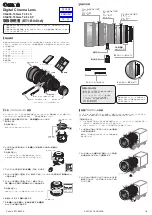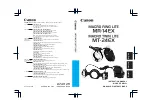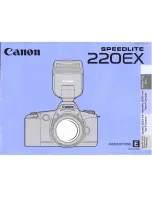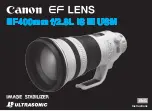
40
Image Adjustment
Sharpening, Tone Comp., Color Mode, and Saturation
In the case of images taken with D2-series, D1-series, D200, D100, D70s, D70, or D50 cameras, the
sharpening, tone compensation, color mode, and saturation settings in effect at the time the photo-
graph was taken are marked with an asterisk (no asterisk will be displayed if “Auto” was selected for
sharpening, tone compensation or saturation). Choose
Unchanged
for results identical to those ob-
tained with the camera; other settings may not produce the same results.
Color Mode
If
Use this instead of an embedded profi le when opening fi les
is selected for
Default RGB color
space
in the “Color Management” tab of the “Options” (“Preferences”) dialog (
104, 105), the default
RGB color profi le will be used as the working color space for all images, regardless of the mode selected.
If
Use this instead of an embedded profi le when opening fi les
is not selected, Adobe RGB will auto-
matically be chosen as the working color space for Mode II images. The working color space for Mode I,
Ia, III, and IIIa images will either be the color space selected with the camera (D2X and D200 only) or sRGB
(all other cameras). The working color space for NTSC images (D1 only) will be NTSC. Modes I and Ia,
which are adapted to the sRGB color space, are suited to portraits that will be printed or used “as is” with
little or no mod i fi ca tion. Mode II is adapted to the Adobe RGB color space. This color space is capable
of expressing a wider gamut of colors than sRGB, making it the pre ferred choice for pictures that will be
extensively processed or retouched. Modes III and IIIa, which are adapted to the sRGB color space, are
suited to nature or land scape shots that will be printed or used “as is” with little or no modifi cation.
When
B&W
is selected for
Color Mode
, photos taken with the D200 are processed in the same way
as photographs taken with
Black-and-white
selected in the camera
Optimize Image
menu. Photos
taken with other cameras are processed in the same way as images converted to black-and-white using
the
Effect
>
Black and White
option in the “Photo Effects” palette (
64).
Tone Comp
: Adjust image contrast. Choose from
Unchanged
,
Low Contrast
,
Medium
Low
,
Normal
,
Medium High
,
High Contrast
, or
User-Defi ned Custom Curve
. Be-
cause the D1 does not store cus tom curves in the image fi le, set tings of
User-Defi ned
Custom Curve
are equiv a lent to
Normal
when se lect ed with pho to graphs taken with
the D1. With D2-series, D1
X
, D1
H
, D200, D100, D70s, D70, and D50 cameras, selecting
User-Defi ned Custom Curve
re stores the tone curve in effect at the time the pho to -
graph was taken.
Color Mode
: Choose a color mode for fi ne control over chroma, brightness, and color
gamut, much as you would choose different kinds of color fi lm for different scenes.
Choose from
Unchanged
,
Mode I
,
Mode II
,
Mode III
,
Mode Ia
,
Mode IIIa
, or
B&W
.
In the case of images taken with the D1,
Un changed
is equiv a lent to D1 Mode (NTSC).
Color mode selection is available only in the case of RAW images taken with D2-series,
D1-series, D200, D100, D70s, D70 or D50 cameras.
Saturation
: Adjust the vividness of colors without affecting hue. Choose from
Un-
changed
,
Moderate
,
Normal
, or
Enhanced
.
Hue Adjustment
: Adjusts hue without affecting brightness or saturation. Hue can be ad-
justed in the range –9 ° to 9 ° in seven steps of 3 °. If red is taken as the start ing color, raising
hue above 0 ° (the de fault setting, at which hue is un changed) would in tro duce a yel low cast,
mak ing col ors that would be red at a setting of 0 ° ap pear in creas ing ly or ange. Low er ing hue
be low 0 ° would in tro duce a blue cast, mak ing col ors that would be red at a setting of 0 ° ap-
pear in creas ing ly purple (in the case of the D1
X
and D1
H
, –9 ° is equiv a lent to a camera hue set-
ting of 0, 0 ° to a setting of 3, and 9 ° to a setting of 6). To use the value for hue ad just ment
in effect at the time the photograph was taken, turn the
Hue Ad just ment
check box off.
Summary of Contents for 4DIF
Page 1: ...En Ver 4 4 En Ver 4 4 ...
Page 10: ...6 ...































